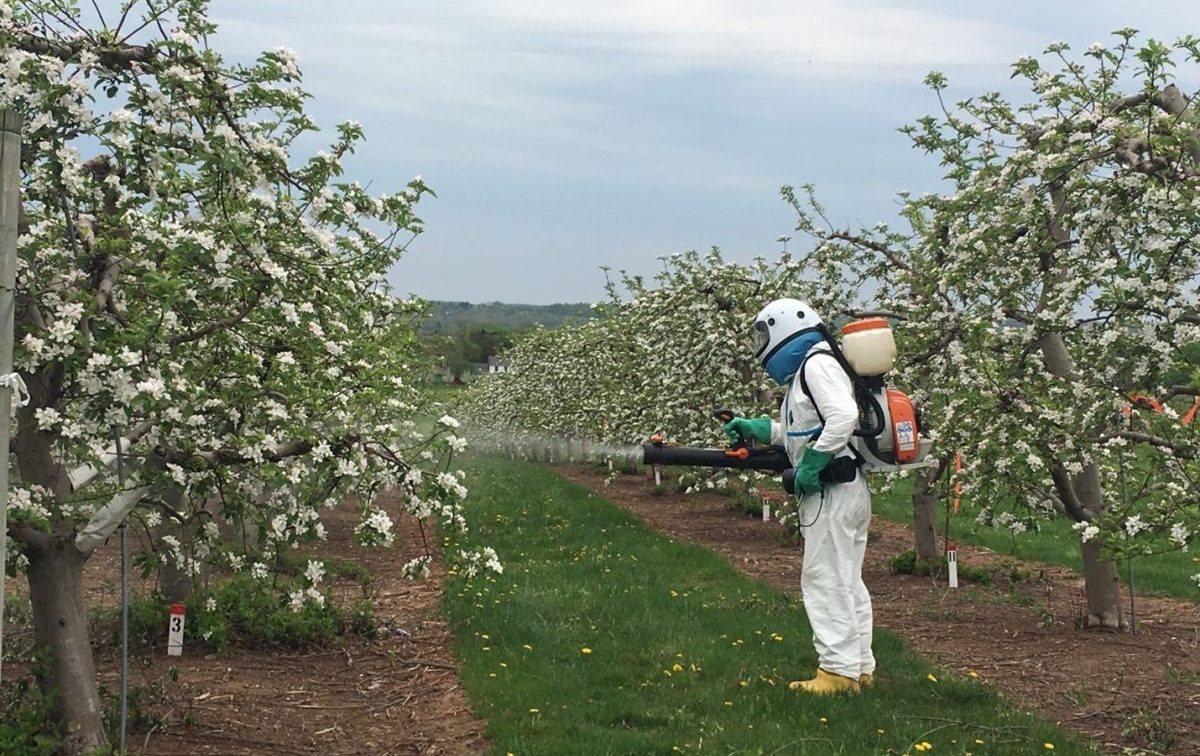By Holly Riddle

Photo: Kari A. Peter.
Late last year, HappyValley Industry covered the Ben Franklin Technology Partners 2022 BIG IDEA Contest. The 2022 contest focused specifically on the agricultural, food and beverage industries and the second-place winner — and recipient of $10,000 to further his business — was Penn State researcher and associate professor of plant pathology and environmental microbiology, Timothy McNellis. His groundbreaking product is called Blightavast, a unique new solution to combat fire blight, and his new company is called Immunagreen.
We wanted to know more about the impact Blightavast stands to make on its industry, how McNellis ended up winning a BIG IDEA Contest prize and what he’s done with his winnings thus far, so we reached out to see what we could learn.
Finding a solution for a Pennsylvania problem
McNellis was hired at Penn State as an assistant professor in 1999 and says he’s been working on fire blight research ever since.
“When I arrived [at Penn State], my supervisor at the time recommended that I should work on something that was important in the state of Pennsylvania. My supervisor helped me connect to people working on fire blight because I’m a bacteriologist and fire blight is one of the most important bacterial diseases in the state of Pennsylvania. Apples are an important crop here and the disease is a challenge for growers in the state every year,” explained McNellis.
“Apples are an important crop here and the disease is a challenge for growers in the state every year.”
If you’re not up to speed on your agricultural terms, fire blight is a contagious bacterial disease that impacts apple and pear trees, killing blossoms, shoots and, in severe cases, the entire tree. When allowed to run rampant, it can cause extensive damage to orchards, which, of course, comes with major economic impacts. One study from the 2000s estimated that the annual cost of fire blight control and losses in the United States totals more than $100 million.
Currently, growers use antibiotics to combat fire blight, but this solution isn’t ideal.
McNellis said, “People want to use fewer antibiotics in agriculture and, in fire blight, there is a problem with antibiotic resistance in the target bacterium. That gets a lot of press — antibiotic resistance in medicine — and the same happens here, in that you keep using the antibiotic and eventually the target becomes resistant. So what do we do? Do we switch to a new antibiotic or is there some other approach? In fire blight, there’s a need for other approaches, not other antibiotics … Our product is a non-antibiotic that has potential to at least partially replace antibiotic use.”
Blightavast’s active ingredient is biological, a harmless microbe, which comes with a lessened environmental impact compared to other options. Any residue only lasts a few weeks after application, so there’s no impact on the end consumer. For the grower, cost and labor incurred from using Blightavast will be comparable to current solutions.
Making the big switch from research to commercialization
But while Blightavast seems like a no-brainer solution to a very real problem, McNellis came across the beginnings of the Blightavast product almost out of sheer luck.
He said, “We made a discovery in the lab that looked like it might have an application in the field. On a hunch, we tested it and it worked pretty well right off the bat, which surprised me. I thought, if it works that well, we should really try to commercialize it.”
The switch from research to commercialization, though, was not necessarily an easy one. McNellis admits he didn’t have much prior experience in the business side of things. Suddenly, in order to get a viable product to market, he needed to not just consider whether or not the product worked, but also whether or not it would be marketable to its intended buyer.
“There’s the technical challenges of making sure it works, but if you have something that works that’s too expensive, then it’s useless,” he said. “Especially in agriculture, it has to be cheap. That’s the challenge now, to formulate this in a way that is cheap enough for us to make a profit and for growers to also be able to pay for it and maintain their profits.”
McNellis sought help from a range of Penn State and Ben Franklin resources as he got started. He participated in the Ben Franklin TechCelerator Program first, a process that he calls “extremely useful,” noting he “can’t say enough about how awesome the course is.” While he didn’t win any of the prize money available to TechCelerator participants, the experience and what he learned did set him up to succeed in the BIG IDEA Contest.
Now he’s using the $10,000 contest prize to pay for additional field testing to both affirm efficacy and receive Environmental Protection Agency (EPA) approval that is required before bringing the product to market. Testing takes place on experimental farms intended for this use throughout Washington State, Pennsylvania, New York and Michigan.
“It’s very encouraging that the EPA is letting us do these tests without any special permit or oversight after their initial safety review of our product,” commented McNellis.
Looking to the future, post-EPA approval, McNellis is already thinking about expanding Blightavast’s use to other crops, which will build the business further.
“Although the disease is serious for apples, the overall market is not really large,” said McNellis. “We estimate about a $20 million market value that we’re trying to get our share of, which sounds big, but, really, in the bigger picture, it’s not that large, only enough to drive a small operation. So, we’re thinking about how to move this technology to address other plant disease problems, and that’s still under development.”






